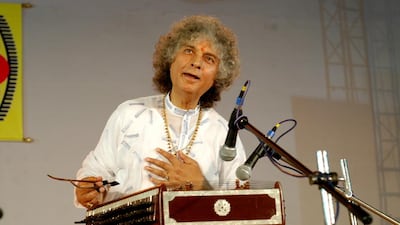Shivkumar Sharma started his journey into the world of music at the impressionable age of five under the tutelage of his father, Uma Dutt Sharma, a santoor player.
At 13, Sharma picked up the santoor (stringed hammered dulcimer) himself and found his calling. Today, he is one of India’s most accomplished musicians and the recipient of numerous awards.
How do you feel about performing in Dubai?
I am not new to Dubai and Dubai is not new to me. I think I first performed here about 35 years ago. Since then, I have played in Dubai, Abu Dhabi, Sharjah and all over the Gulf. My last visit to Dubai was about eight months ago. I have been performing internationally since 1968 and the one thing I have come to realise is that there are connoisseurs of Indian classical music all over the world. What I find in Dubai is a great mix of different nationalities and they all come together to appreciate such music.
Who will be your accompanying musicians this evening?
On the tabla (hand drums) is Ramkumar Mishra from the Banaras gharana. On the pakhavaj (two-headed drum) is Bhavani Shankar, one of the foremost pakhavaj players of India. There’s Dilip Kale, one of my senior disciples. Though he is accomplished at playing the santoor, here he will accompany me with the tanpura (lute).
When it comes to Indian classical music, what sets the santoor apart?
While 60 years ago nobody knew about the santoor, today it is an integral part of Indian classical music. It is a very old instrument, deeply ingrained in the history of the music of this region.
The original 100-stringed version was native to the valley of Kashmir, where it was used as an accompaniment for Sufi music. I introduced it to Indian classical music just like the shehnai (oboe) was introduced by Ustad Bismillah (Khan).
What drew you to the santoor?
The santoor is a beautiful instrument like no other. It has a unique tonality. It was my father’s instrument of choice. When I started playing, there was scepticism from various musicians and music critics that the instrument was not suitable for Indian classical music. So I modified it.
How did you do that?
The santoor is usually found in Sufi music, a totally different genre. I played it to Indian classical music. I changed the tuning, the playing technique, even the number of strings. I reduced the number of strings from 100 to 91 but increased the range.
What can we expect from Friday’s performance?
In Indian classical music, we don’t rehearse or plan before we take the stage. Our music is improvised. I have not decided what I will play. I will do that when I go into the auditorium and my accompanying musicians will play alongside according to their own experience. Our music is different from western classical music or the symphony style. We don’t play note for note. We have the freedom to play from the heart. That is the whole beauty of Indian classical music: improvisation. At this performance, you can expect anything from spiritual and meditative to romantic music.
• Shivkumar Sharma will perform at Centrepoint Theatre at Ductac on Friday at 8pm. Tickets cost Dh150 and Dh200 and can be bought at the Ductac box office

